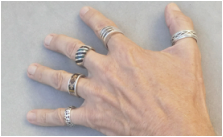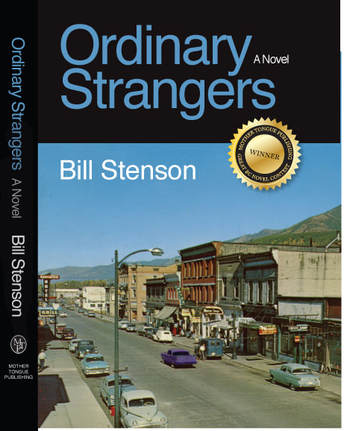
Autobiography
Writers are funny people. I know a lot of them. A few that I know are outgoing but this is the exception. Most writers are observers and shy away from being the MC of anything. MC's are the ones being observed.
Canadian writer Dave Godfrey once said the one thing that was frequently common among writers was a period in their lives when they were bedridden for one reason or another. The benefit to such inconvenience, I believe, is that they got to sit back and observe and read and think. Writers, if nothing else, are thinkers.
Non-writers think too, of course, or we wouldn't have made it to the moon or have the Internet at our beck and call, but it's the kind of thinking that writers do that is fascinating. Margaret Lawrence often referred to a fiction writer's memory and I think there is such a thing. They tend to remember clearly emotive instances that are links to a story of some kind, and this memory often includes the words said, the colours worn, the perfume dabbed. It sounds mysterious and intriguing but in many ways is a curse.
I remember words that were spoken over my parents' marital breakup. I was five years old at the time. I can smell the parsnips cooking on the stove, my brother trying to deflect the angst in the house by doing a headstand, the canned cherries I refused to eat for dessert. W.D. Valgardson once said if an author had to rely only on what he or she had learned up to the age of six they would have enough material to write for life. I believe it.
At age five I was apparently learning to play the piano and read. The piano, after the family broke up, was never again part of my life, but I did continue to read. I read a lot up until about grade six and then it was building forts and playing sports that took over. I've often heard writers cite the words of a teacher that praised something they'd done that became some kind of catalyst to their future and that happened to me too. Mr. Garnett was our English teacher in grade eight and I can't remember the assignment but I guess I wrote more than most people and he told everyone when he read it he felt like he was reading a novel. I still blame him to this day.
I started writing non-fiction. Odd as it sounds, it was just for fun. I would hunker down in the local library in our small town and research and write reports on cities like Edmonton and New York (I still remember the Empire State Building has 102 floors) and I delved into red blood cell research as well. I wrote poetry too and sucked at it. Thankfully, the poems have been mislaid or destroyed, likely the latter.
I absorbed many stories before I ever attempted to write one. I did this by reading of course but also by listening to people, especially older people. I prefer not to talk much at parties. Listening, for me, is delicious. A fellow writer, Jay Ruzesky, once said to a large audience: "Writers generally don't like people much." Some were shocked by his words. The writers in the room laughed. If sociability were an addiction like smoking, many writers would find boundless pleasure in one cigarette before bedtime.
Writers are funny people. I know a lot of them. A few that I know are outgoing but this is the exception. Most writers are observers and shy away from being the MC of anything. MC's are the ones being observed.
Canadian writer Dave Godfrey once said the one thing that was frequently common among writers was a period in their lives when they were bedridden for one reason or another. The benefit to such inconvenience, I believe, is that they got to sit back and observe and read and think. Writers, if nothing else, are thinkers.
Non-writers think too, of course, or we wouldn't have made it to the moon or have the Internet at our beck and call, but it's the kind of thinking that writers do that is fascinating. Margaret Lawrence often referred to a fiction writer's memory and I think there is such a thing. They tend to remember clearly emotive instances that are links to a story of some kind, and this memory often includes the words said, the colours worn, the perfume dabbed. It sounds mysterious and intriguing but in many ways is a curse.
I remember words that were spoken over my parents' marital breakup. I was five years old at the time. I can smell the parsnips cooking on the stove, my brother trying to deflect the angst in the house by doing a headstand, the canned cherries I refused to eat for dessert. W.D. Valgardson once said if an author had to rely only on what he or she had learned up to the age of six they would have enough material to write for life. I believe it.
At age five I was apparently learning to play the piano and read. The piano, after the family broke up, was never again part of my life, but I did continue to read. I read a lot up until about grade six and then it was building forts and playing sports that took over. I've often heard writers cite the words of a teacher that praised something they'd done that became some kind of catalyst to their future and that happened to me too. Mr. Garnett was our English teacher in grade eight and I can't remember the assignment but I guess I wrote more than most people and he told everyone when he read it he felt like he was reading a novel. I still blame him to this day.
I started writing non-fiction. Odd as it sounds, it was just for fun. I would hunker down in the local library in our small town and research and write reports on cities like Edmonton and New York (I still remember the Empire State Building has 102 floors) and I delved into red blood cell research as well. I wrote poetry too and sucked at it. Thankfully, the poems have been mislaid or destroyed, likely the latter.
I absorbed many stories before I ever attempted to write one. I did this by reading of course but also by listening to people, especially older people. I prefer not to talk much at parties. Listening, for me, is delicious. A fellow writer, Jay Ruzesky, once said to a large audience: "Writers generally don't like people much." Some were shocked by his words. The writers in the room laughed. If sociability were an addiction like smoking, many writers would find boundless pleasure in one cigarette before bedtime.
